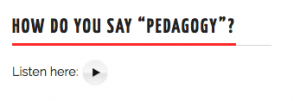J’ai eu le plaisir de présenter un atelier sur la conceptualisation d’une présence numérique à plusieurs étudiants aux études supérieures à la Faculté d’Éducation hier. En bas je partage les diapos qui ont encadré nos discussions.
Questions que les participants ont posées
Q: La sécurité: Comment me protéger en ligne?
R: Quelques conseils — ne mettez jamais votre adresse, votre numéro de téléphone sur votre site web. Moi, personnellement, je ne mets même pas de courriel sur mon site web. Les gens peuvent me trouver à l’Université, mais je ne veux pas inviter les courriels non-solicités non plus. Il faut aussi considérer les images que tu utilises — à quel point est-ce que tu veux être identifié sur ton site web en images? Et pour ceux et celles qui travaillent dans les écoles ou dans les contextes avec les populations vulnérables, il faut aussi considérer comment les protéger. Les élèves peuvent être identifés par ton lien avec eux par exemple — alors, ne dit pas à quelle école tu travailles, même sur ton CV en ligne. Décris tes expériences et le contexte en termes généraux…mais évite de partager les informations personnelles.
Q: Où commencer?
R: Avec les affiches sur ton blogue liées à tes études. Même les analyses des articles, les commentaires et réflexions sur les idées majeures dans ton domaine — c’est un bon point de départ. Et écrivant, tu vas trouver ta voix, et tu va commencer à voir ce que tu peux faire sur ton site web professionnel. Même si éventuellement tu va écrire pour un public cible, commence en écrivant pour toi-même.
Q: Comment respecter et protéger la propriété intellectuelle?
Creative Commons. C’est la meilleure ressource que je connais. Tu peux mettre une license sur tes travaux et au site, tu peux aussi chercher les images, sons, de la musique créés avec une license ouverte.
I was pleased to offer a workshop to our Faculty of Education graduate students yesterday on the design and creation of a scholarly online presence. Here are the slides that framed our discussions. Participants asked several questions. Here they are with my responses:
Q: How do I keep myself safe online?
R: Obviously, you want to keep your identity safe. So, follow basic rules like never putting up your home address, telephone number or even your email. You might include this information on a CV that you would send with a specific job application, but online, provide a different CV. Focus only on your work and don’t give the personal info. If someone wants to find my email, they can always do so at the University website. I don’t want to make it too easy for people to gather up all of that information from one place. In addition to protecting your own identity, you also need to protect the identities of your students and research participants because they can be identified through you if you give out too much info — like the school where you work or conduct research.
Q: Where should I start?
R: Start by writing about what you’re thinking about in your PhD or M.A. classes. Are you analyzing an article or trying to make connections between a body of literature and your own professional practice? Write about that. There is inherent value in this work TO YOU — and even though you will eventually want to create something that is of value to others, as you get started, I recommend writing for yourself. Synthesize your ideas. Find your online writing voice and then scale up your work.
Q: What about intellectual property? How can I protect it?
R: Start at the Creative Commons website. This is the best resource I know that can help you to think about the way you want to license the creative work that you share online. Also, you can search through the CC website for free-to-use images, sounds, music tracks etc. It’s a wonderful and valuable resource and set of licenses that are designed to help you control your own intellectual property and respect the intellectual property of others.
If you’re interested in contributing to this research and have about 15 minutes of time, you are invited to submit responses to the shorter version of the survey here.
]]>
Download slides: digitalcitizenship_sept16_v1










































]]>
My go-to strategy is always to just Google a solution. And, as luck would have it, I found a terrific tutorial at Monkey Raptor. Using the code and the tips provided there (thank you, Monkey Raptor!) I was able to successfully embed a Twitter timeline widget on the Google Site that I recently built to support our edtech initiatives in the Teacher Education program at the University of Ottawa. And, I created a screencast to show how I did it. Lots of little steps along the way — but I hope that others can benefit from this little how-to video.
One thing to know, you can create a timeline widget like the one I created for aTwitter handle too – you just have to select “profile” and then “handle” when you create the Twitter widget rather than “search”. Since this is a community site, I chose to embed the timeline of our community hashtag #UOttawaEDU but if you’re integrating a timeline on a classroom or professional portfolio site, then it would make more sense to integrate tweets by you or by your class using your @handle 
 I started my first teaching job in September of 1996 and today, 20 years later, I had the privilege to welcome students at the University of Ottawa Faculty of Education to their very first class in their professional preparation program. The course I’m teaching this semester is about Curriculum Planning, Instruction and Assessment. It’s a foundations course that every teacher candidate has to take and I decided that rather than just talk about the course (as is typical on Day 1) I would ask my new students to just jump right in and start designing learning experiences and assessments that would address a single overall expectation for Grade 1 Dance.
I started my first teaching job in September of 1996 and today, 20 years later, I had the privilege to welcome students at the University of Ottawa Faculty of Education to their very first class in their professional preparation program. The course I’m teaching this semester is about Curriculum Planning, Instruction and Assessment. It’s a foundations course that every teacher candidate has to take and I decided that rather than just talk about the course (as is typical on Day 1) I would ask my new students to just jump right in and start designing learning experiences and assessments that would address a single overall expectation for Grade 1 Dance.
As we deconstructed the process of planning in the short amount of time we had, students realized:
(a) that curriculum documents use specialized, disciplinary language;
(b) that overall expectations could be interpreted in diverse ways;
(c) that they weren’t sure how best to assess this expectation, or how to plan a scope and sequence of evaluations over the course of the year to be sure they fit everything in;
(d) that they probably needed more information about how the Ministry would recommend the expectation be taught.
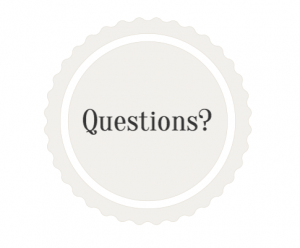 As their ticket out the door, I asked students to write down a burning question. I wanted to know what questions their first class raised for them, and I also wanted to understand what kinds of follow ups will be needed. Categorized by theme, here are students’ questions. If you’re a teacher or an educational leader, what advice would you offer? I feel like I have the next year’s worth of blog posts laid out for me right here in this list, and a clear sense of how these young teachers have begun to think about the complexities of planning, teaching and assessing student learning.
As their ticket out the door, I asked students to write down a burning question. I wanted to know what questions their first class raised for them, and I also wanted to understand what kinds of follow ups will be needed. Categorized by theme, here are students’ questions. If you’re a teacher or an educational leader, what advice would you offer? I feel like I have the next year’s worth of blog posts laid out for me right here in this list, and a clear sense of how these young teachers have begun to think about the complexities of planning, teaching and assessing student learning.
Curriculum & Planning
- Does it become easier to navigate the official/intimidating language of curriculum documents?
- How do teachers balance and maintain the overall expectations for each subject?
- Are the overall expectations for activities always so vague and up for interpretation?
- How do we reconcile the excitement for creativity (e.g., dance) wtih the need to educate?
- How do I plan, implement and assess activities that both meet Ministry standards as well as reflect who I want to be as a teacher?
- How do you plan and assess curriculum expectations throughout the year?
- Why is cursive not taught anymore? It’s an important life skill.
Assessment
- Will we discussing more on assessments?
- How will you (as our professor) assess how well we are doing in ths course?
- How do you incorporate all levesls of abilities to be fairly assessed?
- How many people will be in the group for the last assignment?
- How does a teacher assess fairly and effectively?
- How do you take into account IEP learning when doing assessments?
- Is there an ideal way to assess a student?
Classroom Management
- What should we do if kids don’t ever get along with group or in groupwork?
- How do you discipline problem children without separating them?
Technology
- How do you feel about integrating technology with young learners when adults in theis day and age have become non-communicative in a face-to-face capacity? How can we as educators combat this change?
- Will you explain the online tools that we have to use for class?
- How does the use of technology in the classroom as a teacher effect the attitudes of students wanting to use their onw technology at an inappropriate time?
- Will there be extra help to learn about various technologies, apps, websites that we will be using in this class and as a teacher? (for those who are not tech savvy?)
- I read ahead and read something about a digital hub. I was wondering if we could have a bit more explanation on this?
- What technology will we be using to help us assess the curriculum?
Course or Program Logistics
- How does reading curriculum impact the choice of teaching a particular subject? Is there a specialization in P-J?
- How do we know about available workshops or certificates available for us during the year?
- In this course, are we going to learn the curriculum and how to assess it for kindergarten to grade 6?
- How will we be submitting our online documents?
- Do you think an outside job will be unrealistic with our course load?
- What is the attendance like?
- How exactly does a hybrid course work? I’ve never had one and am nervous about it.
- How much time should we put aside for weekly readings?
Development as Professional Teacher
- How long did it take you to start “thinking like a teacher”?
- What’s the best advice to give to a student teacher regarding approaching difficult parents?
The site’s founder and principle author, Jennifer Gonzalez is a teacher. On her About page, she writes, “With this site, I hope to create what I did not have myself: a vibrant, encouraging, stimulating community of teachers, supporting each other toward excellence.” Her posts are informative. She focuses on what is possible. She provides access to practical knowledge and is incredibly thoughtful in the way that she makes explicit connections to curriculum, to methods of assessment and to theories of teaching and learning.
As a reader of the site, I often wonder how Jennifer sources ideas for her Blog posts and how much time she spends researching the posts she writes, gathering the multimedia to support the post, and positioning the post in a way that will engage her audience. The site definitely inspires me to reconsider the ways that I position posts I write for teachers on my own blog.
New Teachers, this is a resource that you will not want to miss! Bookmark it. Now. Really.
Listen to Jennifer explain how to pronounce the word Pedagogy on her homepage. Definitely worth a listen.
[Screenshot: How do you say “Pedagogy”; CultofPedagogy.com, Jennifer Gonzalez]
]]>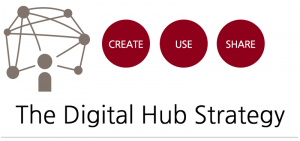
This week, I’ll be introducing a new Digital Hub strategy to B.Ed. candidates at the University of Ottawa. The strategy, which I co-authored with my colleagues Linda Radford and Maria Robinson-Cseke, is designed to support our B.Ed. candidates as they develop a positive digital presence for themselves as professionals.
There will surely be MANY insights gained from this initiative.
The basics are outlined here, at a Google Site that I developed for EdTech at UOttawaEDU.
]]>During orientation, ICI students will be working in groups with found objects and a few art materials to create an installation that represents the cohort, its focus, its themes in some way. Once they have created their art, they will photograph it with their mobile devices. The curated collection of these images will be an enduring document of the day, and of the promise these young teachers bring to our profession.
And yet, the question has always been, how can we easily curate the photographs?
We could ask students to upload the image to a Google Drive folder, or even email the images to an administrator. These images would have to be added to a static gallery on the site. In the past, we have asked students to Tweet out their images — and of course, the Twitter widget curates tweets that include the #iciUO hashtag.
Both of these solutions work, but neither is ideal. The first takes ridiculous amounts of time. The second isn’t as beautiful, aesthetically, as we might like for a set of photos.
This is where the Gosh Social Gallery App comes in.
The ICI cohort website is built on Weebly — so this is a Weebly-only application.
The app works by curating all of the images that your students (or fans) tweet or instagram using a single hashtag. So, for us, the cohort hashtag is #iciUO. By adding the app to the site, we will create a responsive gallery, in real time, of all of the images our students create during orientation. Now, clearly, there is a certain level of trust required to put a real-time photo gallery on an institutional website. Students could easily hack this whole thing by posting images that don’t align with the Acceptable Use Policy…ahem.
However, the upside is that as the teacher or website administrator, this app does all of the work fo you — no photos to requisition, download, upload, organize. You just add the app to Weebly, tell the students the hashtag to use on Twitter or Instagram, and voilà — the gallery gets created in real time when students Tweet or Instagram their photos with the #iciUO hashtag.
So far, one other downside seems to be that older images on our hashtag aren’t being pulled into the application, even as “placeholder” images. This means that the gallery is a bit ethereal — not really an enduring archive. It is constantly updating, so older items will get pushed out with time.
I’ll post a shot of the #iciUO gallery once it gets created this week during orientation, but for now, here’s a screenshot of a test I tried with the #UOttawaEDU hashtag.
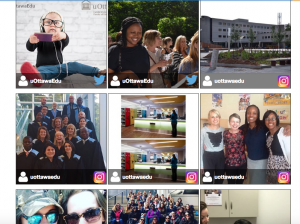
A little context. I arrived as a new Assistant Professor in Educational Technology at the University of Ottawa last fall. For years, at Michigan State University, where I did my PhD and then managed graduate certificate programs in Educational Technology and Online Teaching and Learning, I had access to an institutional account that also gave access to a Google Drive — but at UO this year, I have not. And, at the beginning, I felt a little confused because my process wasn’t possible using an institutional account. At MSU, I used Google Drive extensively to manage my courses, to gather data through Google Forms, and in particular to provide ongoing feedback to students in my courses. My use of Google Docs to provide individual feedback to students emerged largely from work in the Master’s of Educational Technology program there — with Alison Keller, Bill Marsland, Melissa White, and Leigh Graves Wolf, we developed documents for our online courses called Evaluation Notebooks. The Evaluation Notebook is just a simple Google document that includes all of the assignments, due dates and assessment criteria for each assignment that students will complete during the course. Here are a couple of examples:
Evaluation Notebook for an MSU course in Technology Integration: CEP 810
Evaluation Notebook for a UOttawa Graduate Course in Technology and Learning: EDU 5287
At the start of the semester, I make a copy of the Evaluation Notebook (ideally, using Doctopus OR Google Classroom) for each of my students. (HT to Sean Sweeney for telling me about Doctopus.)
This document is shared privately between instructor and student — it is not open or public in any way. Yes, it is on the cloud and therefore open to the US Patriot Act — it could be requisitioned by the US Government. However, the nature of the communications in those documents is focused entirely on the work that students do. The questions are about how to frame ideas related to the course, learning resources of value, how to improve a draft of written work etc. — evidence, frankly, of deep engagement in a learning process. The data is not sensitive in the ways that health information is sensitive; or information about criminal activity, or trauma, or experiences that are deeply emotional and personal. For this reason, I feel that the advantages of the cloud as a pedagogical space far outweigh the risks of an information “hack” to the student, or to me.
Okay — so to the present. I asked around about getting access to Google Drive through an institutional email at UOttawa last fall. The answer, for Faculty, was no. Students have institutional gmails — but faculty do not. The institutional agreements with Google do not extend to Faculty. Our email is managed differently because of the higher levels of security required for Faculty communications. This, I completely understand — and yet, in Education, where Google Classroom, Google Drive, Google Apps are so widely used in contexts of schooling — access to the Google suite of tools is pedagogically fundamental today. I cannot prepare teacher candidates for the realities of their workplace environments without having prepared them, at the very least, to use Google applications in their teaching.
So, I tried again. I just kept on presenting my case to each level of administration, responsible for technology infrastructure at the University and today, in a meeting with some incredibly forward-thinking colleagues in Teaching and Learning Services, I received confirmation that the University is prepared to explore the possibility of a pilot initiative, starting this winter, with institutional Google Accounts for Faculty! Even though the answer had been no, no, and no again (and other colleagues had tried and received the same no response) finally, finally, the ideas were heard!
 So, although agreements will still need to be negotiated, I am feeling incredibly optimistic about a new frontier in technology policy and integration for pedagogy in the Faculty of Education. I’m also feeling really happy to have met people here at the University of Ottawa who understand our needs in the Faculty of Education and who share a vision for what is possible when we work together to support student learning.
So, although agreements will still need to be negotiated, I am feeling incredibly optimistic about a new frontier in technology policy and integration for pedagogy in the Faculty of Education. I’m also feeling really happy to have met people here at the University of Ottawa who understand our needs in the Faculty of Education and who share a vision for what is possible when we work together to support student learning.
More to come on this project and its impact!
]]>
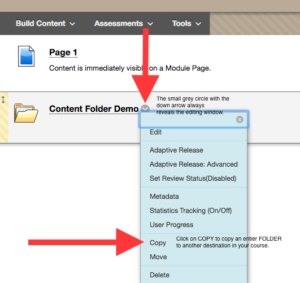
I was at the Faculty of Education awards ceremony in February when Bernie asked me to help him design a hybrid graduate seminar. He had taught the course several times, but wasn’t sure how to revise it so that half of the classes would take place online. Bernie knew that I had some experience with such things and he wondered if I could help him out. He had won a little money from the University to hire a tutor, so it would be like a consulting contract, really.
To be honest, I paused to consider how I would find the time. There were articles to write, a tenure file to build, and I really, really needed a rest. Eight years of no-holiday life as doctoral student, instructor, graduate program coordinator, mother of two young children and now, new assistant professor, were catching up to me. And yet, something in my exchange with Bernie told me that I should find the time somehow.
I had met Bernie a few times at meetings and knew that he was a well respected musician, music educator and scholar in the Faculty of Education. Rumour had it that he was also the most successful grant writer in the Faculty. I also knew he was a committed teacher — though a Full Professor, he was teaching in the summer? And he was seeking support to make the course the best it could be? I figured I would learn a few things simply by being in his presence.
I showed up to Bernie’s office on a Tuesday afternoon. Whereas my office is a jumbled mess of journal articles, travel receipts, unpacked boxes and diplomas on the floor, still taped up with bubble wrap, Bernie’s office is tidy and comfortable. He has a lovely table for meetings at center and a throw rug on the floor. His degrees are curated on the wall above the door. The iconic image of the Beatles walking across Abbey Road hangs between French and English versions of a resource that he created to help music educators.
I realized quickly that Bernie would teach me more than I would teach him. And he did. Our discussions of hybrid course design were balanced with collegial mentorship. One day, he told me that it took him 14 tries to get a major grant; another one took 10 tries. The name this academic game, he said, is perseverance. You just have to take every piece of advice that people give you on your reviews and use it to improve your next application. His transparency about his own process allowed me to feel like maybe I could be successful too. I mean, if the “magic recipe” is just hard work – well, that I can do.
I also appreciated the pace with which he approached his work. Methodical. One thing at a time. I admired the way that he worked doggedly to complete the tasks that he set for himself each week. It took him 6 tries to create an introductory video he liked. It took him a few hours of time to create a dossier of exemplars for students to download. He made Sign-Up Genius forms for activities in his class and learned to find, copy and insert YouTube Video embed code. Usually, I’m trying to do several things at once, always splitting my attention. In this project, I didn’t see evidence of Bernie’s workflow being chaotic, like mine. As a result, I’m trying to just be in the moment. Focus on the single task at hand and work more methodically in pursuit of particular goals.
Over a series of 11 sessions, mostly on Tuesdays, Bernie had created a hybrid course for his students that included a range of dynamic features. We covered a lot of content about how to create a hybrid course design in BlackBoard Learn. This document summarizes the work we did together on his course, but it certainly doesn’t represent the genuine mentorship I received as Bernie’s tutor, myself. I’m glad I made the time for this.
Thank you, Bernie.
]]>